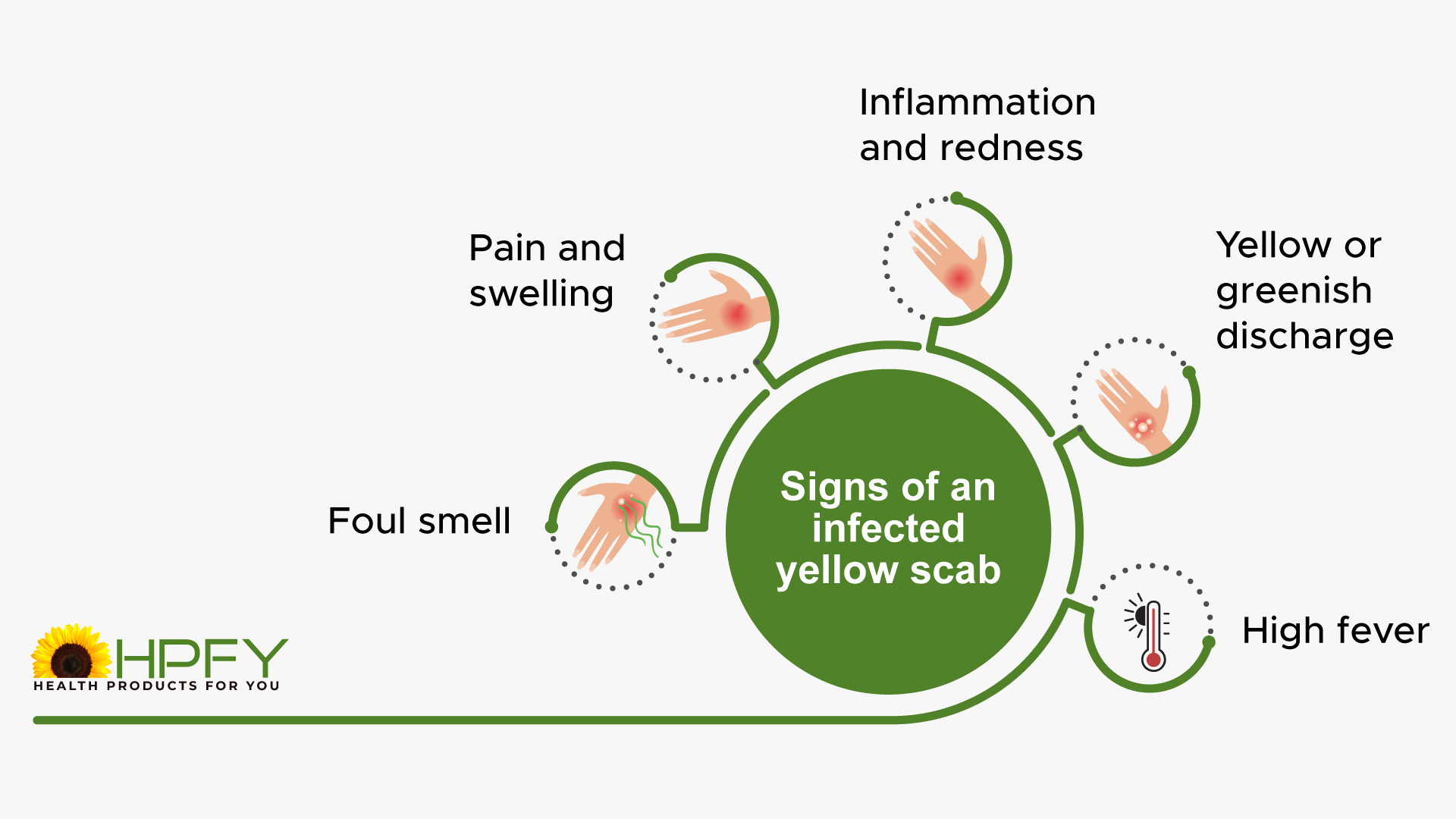Save 25% On Your First Autoship Order
Save 25% On Your First Autoship Order

Our body's natural healing process is remarkable. A healthy scab is a part of normal wound healing. However, a yellow scab on the wound may raise some concerns. If you were wondering what yellow scab means, here are all your answers.
Typically, scabbing happens on an abrasion, a cut, or a bleeding wound to stop the discharge and cover the wound with a protective layer of platelets, fibrin, and red blood cells. This layer creates a clot, which, when it hardens, leaves behind a scab. When the wound heals completely, the scabbing sheds off.
Scabs are of many colors. Sometimes, they start with a dark red appearance, and their color changes to a lighter shade as they age. But many people worry about this and often ask why is my scab yellow? Well, a yellow scab is a protective yellow crust on wound made of dried blood, tissue fluids, and skin cells. The yellow color may be attributed to an exudate called serous fluid. This fluid comprises protein, sugar, electrolytes, and white blood cells, which are important for wound nourishment and help with healing.
A yellow scab may not always indicate something is wrong. However, if it is accompanied by other symptoms such as pain, swelling, discharge, or any other sign of infection, it may require immediate medical attention.
As mentioned earlier, a scab may be a sign that the wound is healing. When a wound heals, it often forms a protective scab, which may appear yellow because of the tissue debris and dead white blood cells.
Conversely, a yellow scab can indicate an infection, especially if it's accompanied by fresh pus, redness, increased pain, or swelling. This infected scab could be Impetigo or other bacterial infection.

If you suspect the scab to be infected, here are some indicators to look out for -
The first course of action when treating any wound or infection is to clean the area. Use an effective wound cleanser to keep the area free from germs. Always make sure to wash your hands before touching the scab. Avoid picking or scrubbing the area to avoid any more irritation.
Once the area is cleaned, apply antiseptic wound healing ointment on the infected scab. Antibacterial ointments offer the wound moisture necessary to heal and fight existing bacterial infections and prevent other bacterial growth.
Use a sterile wound dressing such as gauze or hydrocolloid patch to cover the yellow scab on cut or an abrasion. Change the dressing daily to keep it hygienic and free from bacterial growth.
A moisturizer keeps the skin from getting dry or itchy. Apply a thin layer to the infected scab whenever it feels painful.
Hydration supports many body functions, including its ability to fight scab infection. It enhances blood circulation, delivers oxygen to wounded tissues, and helps them heal faster.
If the yellow scab on a wound is not healing or you find fresh puss oozing out of it, consult your doctor and seek immediate medical attention. It may be a sign of Impetigo. If the cause of the wound is a burn or any other injury, you may require a tetanus shot.
Scabbing on a wound is a part of your body's natural healing process. To keep the scab from getting infected, ensure the wound site is cleaned, moisturized, and covered with a sterile bandage.
Author Profile: Shweta Chaubey

Shweta Chaubey, has been a Health Products For You contributor since 2021. An advocate-turned-writer, her desire to create meaningful and positive content has brought her to HPFY and what better than writing for a health and wellness website, we don’t say it, she does! She believes in the tenants of hard work, honesty, and being humble in all she does. She dreams of becoming an administrative officer and truly making a difference in people’s lives.
 Reviewed by: Christine Kijek, Registered Colorectal Nurse on August 22, 2024
Reviewed by: Christine Kijek, Registered Colorectal Nurse on August 22, 2024

Christine Kijek is a registered nurse with a Bachelor of Science degree in Nursing. She has completed courses for wound and ostomy specialty and has 20 years of experience. She has been a Health Products For You contributor since February 2021. A colorectal nurse at Danbury Hospital in Danbury, CT, she has a wealth of knowledge in the field of ostomy and wound care. An ostomate herself, she has first-hand knowledge about living with an ostomy. Christine hosts HPFY’s monthly ostomy support group and our monthly Ostomy Webinar. Christine enjoys riding motorcycles and gardening. She can often be found onboard a Carnival Cruise ship lounging by the pool with her husband Ed.
Disclaimer: All content found on our website, including images, videos, infographics, and text were created solely for informational purposes. Our reviewed content should never be used for the purpose of diagnosis or treatment of any medical conditions. Content shared on our websites is not meant to be used as a substitute for advice from a certified medical professional. Reliance on the information provided on our website as a basis for patient treatment is solely at your own risk. We urge all our customers to always consult a physician or a certified medical professional before trying or using a new medical product.

Shweta Chaubey, has been a Health Products For You contributor since 2021. An advocate-turned-writer, her desire to create meaningful and positive content has brought her to HPFY and what better than writing ...
How To Increase Iron Levels Quickly
It’s a question that must have puzzled you like many others. Iron is essential in hemoglobin production and its inadequate levels can negatively impact your health. Dive into this informative article to explore top iron-rich foods that can help you fight iron deficiency.
10 Best Coccyx Cushions for Tailbone Pain
If you're like most people, you spend about 8 to 10 hours sitting every day. However unhealthy, it is part of life for many, and can cause tailbone pain. Coccyx cushions can help alleviate this pain. Click to read more and find the perfect coccyx cushion for your tailbone pain.
5+ Best Adult Diapers for Fecal Incontinence
Dealing with fecal incontinence can be challenging, but you're not alone. Read this article and navigate through discreet and effective solutions that help you manage fecal incontinence and let you live life on your terms with confidence and comfort.
Top 5 Best Reviewed Nebulizers of 2024
Need an effective and affordable nebulizer? Look no further, in this article we offer 5 of our best reviewed nebulizers that are loved by our customers. Click to read more and find the perfect nebulizer for all your respiratory needs.
10 Best Penis Pumps For Erectile Dysfunction
For anyone dealing with erectile dysfunction, penis pumps serve as a great way to manage it. But with so many products available, determining the best one for your needs can be challenging. To assist you in refining your choices and making an informed decision, here are our top 10 options, recognized for their effectiveness and safety.